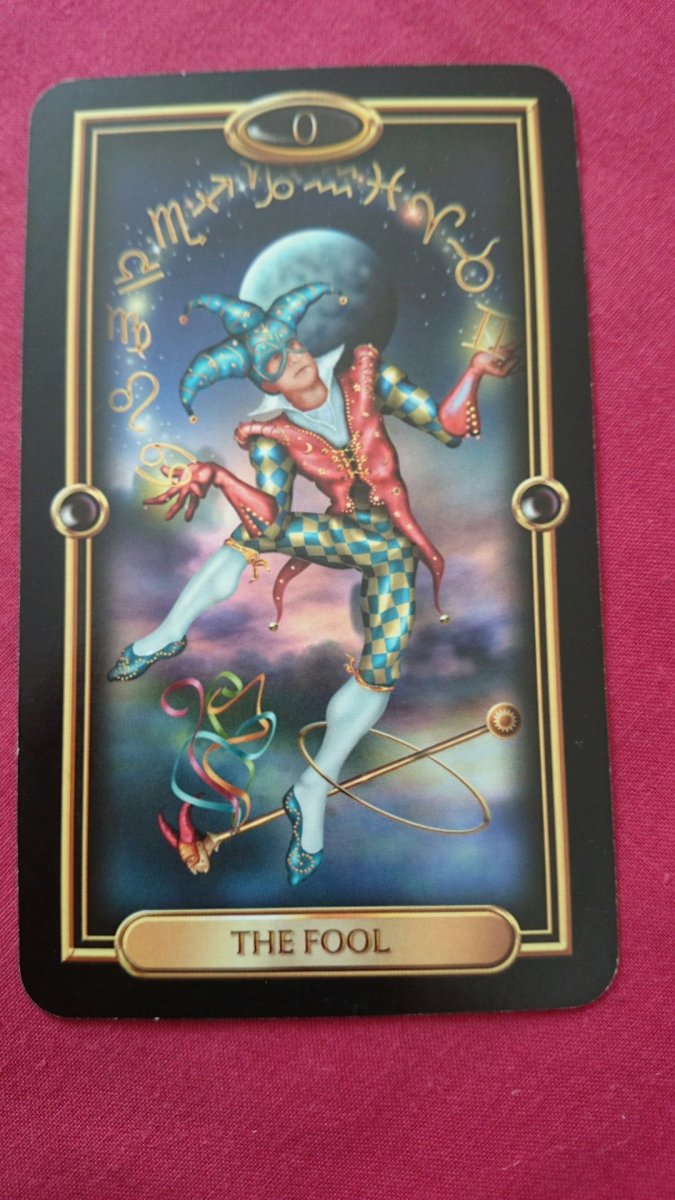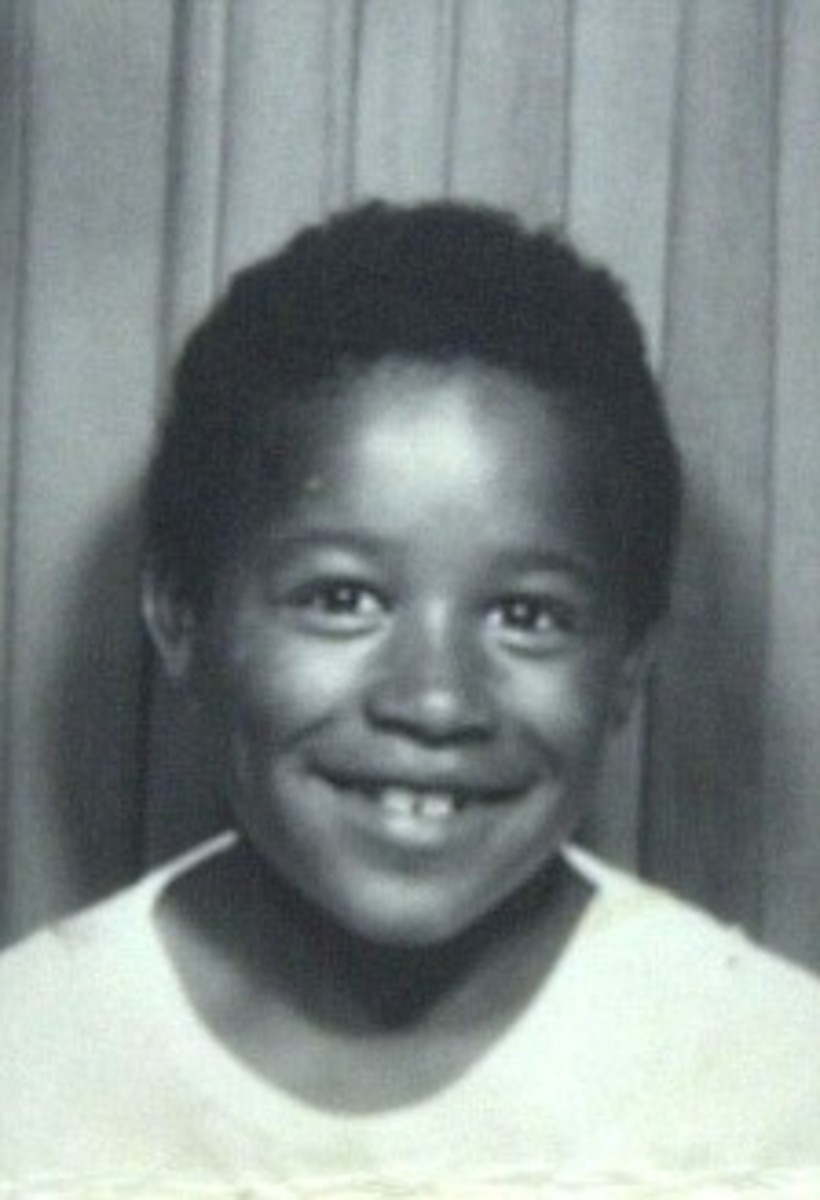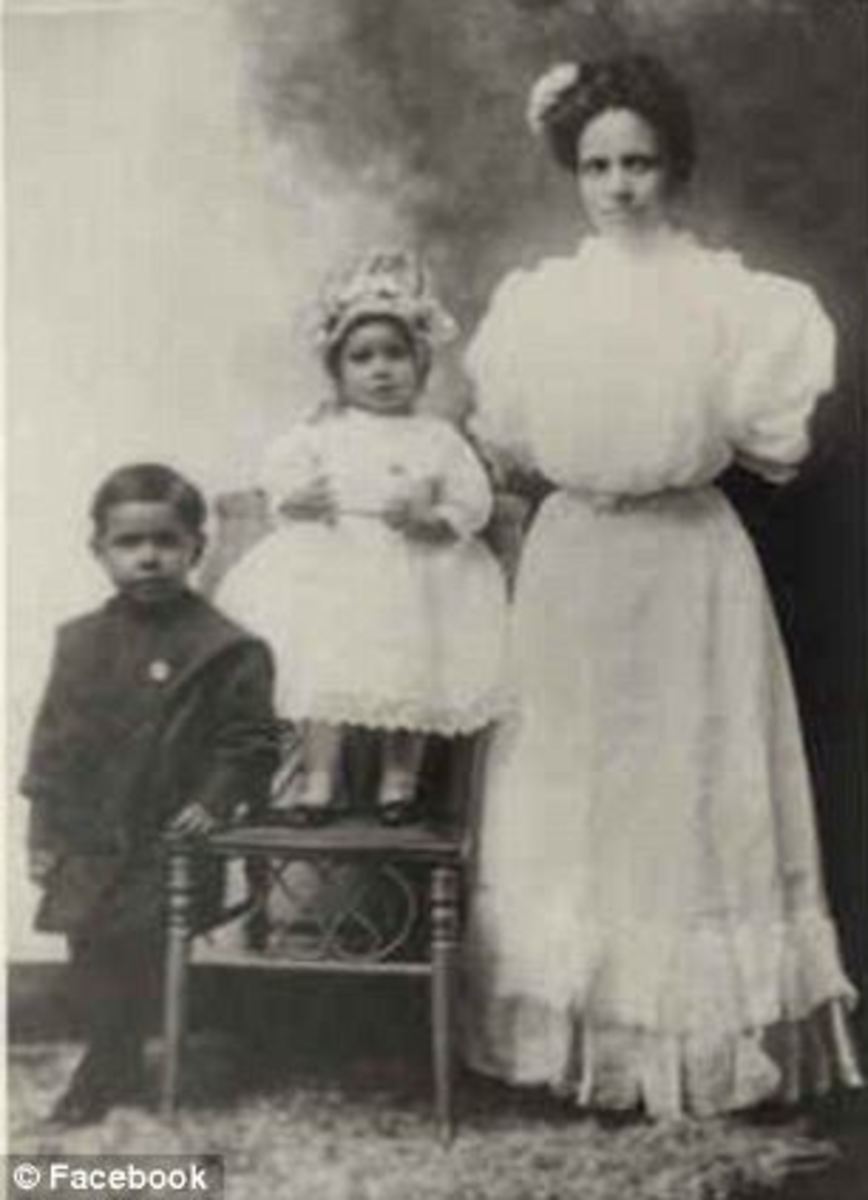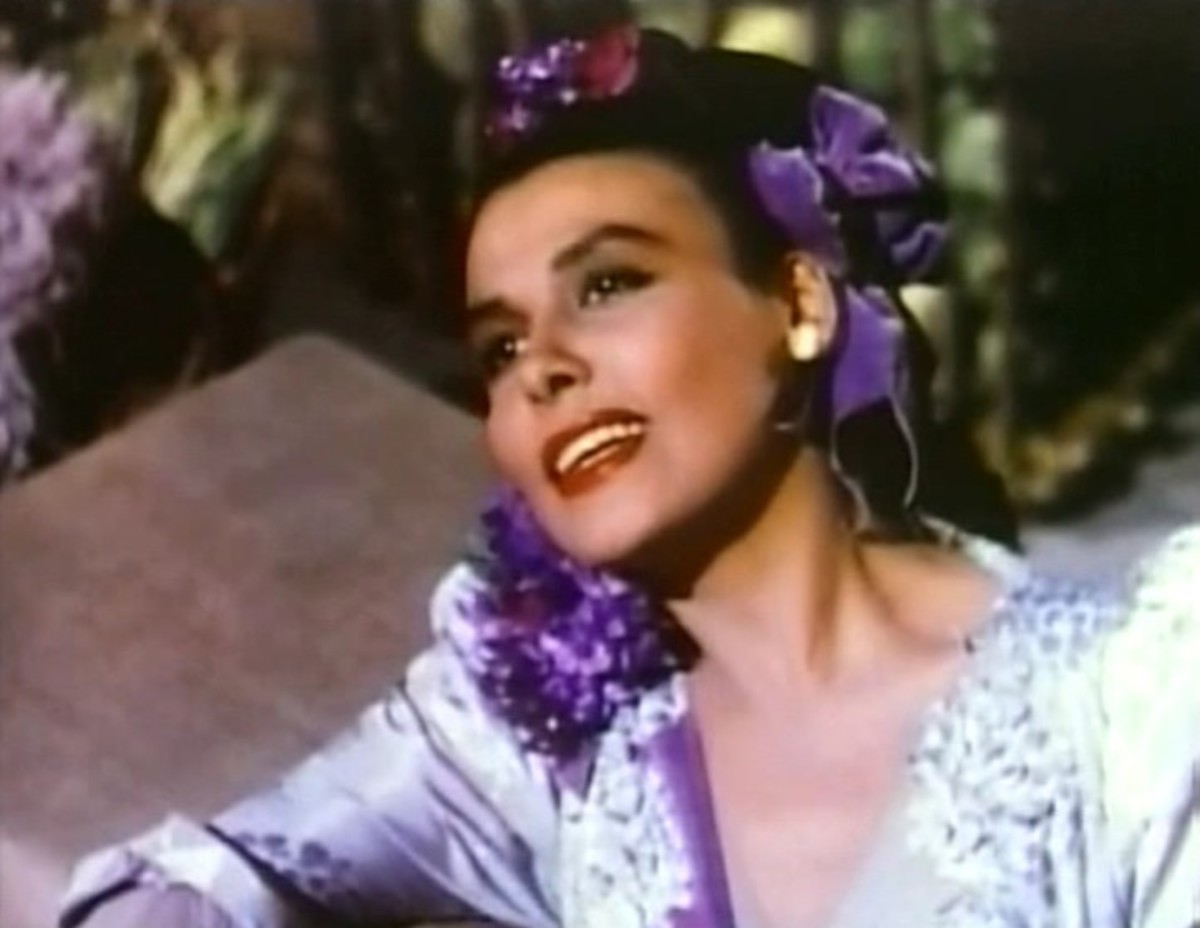Now I Understand Why I Do Not Know
Now I Understand Why I Do Not Know©
There are certain events that happen in a person’s life, that are so significant that it changes the way a person views the world. This short article is about such an event that happened in my life back in the spring of 2001. The event itself not only had an impact on my life and my family, but it also set into motion a chain of events leading me to understand why I do not know and why I can never know certain subjects.
Before I get to the event that led up to this moment of enlightenment a little background information would be helpful. At the time of this incident I was 38 and working in the Equal Opportunity field, conducting race relations training, discrimination investigations and Affirmative Action planning for a better part of a decade. During the fall before this event, I had started to get involved with the diversity efforts of several national organizations.
Even though I have a diverse background of life experiences combined with a fairly good education, each day I am still amazed at the things I do not know and the opportunities that I have to continue to learn and grow. Reflecting back to the start of my Equal Opportunity career there was one statement that was just beyond my comprehension. This lack of understanding was caused in part by my ego. Intellectually I think I had an idea what they were talking about, but emotionally I just did not get it.
The statement in question would usually come about when I was teaching race relations classes and it goes something like this, “You will never know what it means to be a Black man in America today.” This simple, but true statement not only puzzled me; it also sometimes angered me. To myself I would say, “Damn it, what else do you want me to do? I work my ass off trying to ensure everyone receives fair treatment, I have spent years of my life studying the issues related to race and gender relations. What else do you want me to do?”
Figure 1
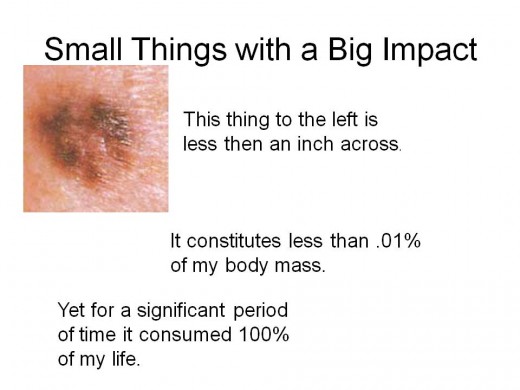
The questioning of my capabilities, my intention, and commitment not only hurt my feelings, it caused me some level of discomfort and frustration. At times, it also caused me to doubt if different races and cultures could truly get along for an extended period of time. To me, what their statement was saying is that two different groups of people cannot possibly know what it means to be the other. There exists a permanent barrier between groups of people.
This statement would normally surface in the middle of a heated discussion and used as a final “in your face” argument for which there was no intelligent rebuttal. The structure of the statement is essentially true, I will never know what it means to be Black or female (or you fill in the blank). I know what it means to be a middle age White male in America today. Even with that information, I did not want to accept the fact that I did not know something, and that I could never know this information.
Then the event happened that changed my perspective on everything. In the spring of 2001, I was diagnosed with a melanoma cancer. Prior to that moment, I never understood how a small spot, smaller than the size of a dime (Figure 1), could have such a large impact on so many lives. As a matter of course, I had surgery, but not all was well, a postoperative test showed a trace of the cancer had spread. Once again a small spot, this time a spot smaller than the head of a needle, was now controlling all the events in my life. It was because of this new spot that I was to be on therapy for the next year.
During my post surgery recovery and as I was just starting my therapy, I received an email from a friend wishing me well. He hoped that everything was going well. In that email he also stated, he “knew” that this is a tough time for my family and me. The line that got my attention was when he stated that he knew what I was going through. My first reaction was, “How the Hell does he “know” what I feel?” How can he know the terror that was running through me when I received the information that I had cancer? I immediately became very angry with this well-wisher. As luck would have it, I decided to wait before I fired off my response to his email. The reason I was lucky to wait, was that my response would have been as angry as I was at that moment, and that would have done no good. He was trying to raise my sprits by wishing me well and lending his support and my email would have chastised him for his efforts.
When I had the opportunity later to reflect on what had happened and why I felt the way I did, that is when I figured out why I did not know. I finally understood why I could never know what it means to be anything other than a White male living in America today. In fact, the only thing I knew for sure was what it was like for me.
The first question I had to ask myself, why did I get angry with someone who was wishing me well? This well-wisher was not a stranger, but a friend I had known for many years and he was (and still is) someone I respected. I realized that it was not just the one event that triggered my reaction; it was a culmination of events that lead up to that email that was the cause of my anger. The manifestation of the emotion happens at a flash point, the cause and the fuel for that flash happened in the background prior to my receipt of the email. Since I was informed that I had cancer and that I was going to have to live with many of the treatments for the rest of my life, there have been many well-wishers who did not understand. There were the ones who tried to reassure me that everything would be "ok". They would say things like, “Its only skin cancer." "They can take care of that no problem." or my favorite, “I had a friend that had cancer and she is fine.” Talking as if they knew what I was going through, even though none of them had the disease. None of these well-wishers were attempting to irritate me, their comments where an attempt to reassure me and provide them with a level of comfort.
By way of this analogy I now had access to the disconnection between understanding and knowing what something is. My friend had general knowledge about cancer which he gained through information that he had researched, or personal experience talking with other people with the disease. However, he did not have access to the information to know what it was like for me to go through this experience.
It was a hard and humbling experience to come to the realization that I did not “know” what it was like to be Black or female or Native American, or whatever. This fact was true, even with my years of study and research. Once I came to the realization, the truth of it appeared to be so obvious to me. I can learn about the events and relationships that surround being a woman or a person of color in America, but I can never know what it is like to be a woman or a person of color. To know, in this instance, refers to having first person experience of the phenomenon. To understand means that I can conceptualize the relationships that produce the phenomenon but I have no first hand experience. I know what it means to be me and I am trying to understand what it means to be other people.
Caucasians do not have to go through what the author of Black Like Me did to gain an insight to what it is like to be considered as “other”. The author of that book, John Howard Griffin, actually went through a process that temporarily changed his skin color to pose as an African American male traveling through some southern states in 1959. He did this so he could report from firsthand experience how people from the African American community were being treated. Temporarily changing your racial identity may help some people become aware; however, that awareness would be in relation to their other life experiences. The information received was still not truly a firsthand experience, because it was filtered through a White man’s eyes that have the option of not being Black.
Does this inability to have first hand experience mean that we, as a society, cannot come together or find some common ground? Absolutely not, because while the experience I had was hard and humbling, it was also freeing and came with greater responsibility. It was freeing because I was not required to have the answer. At the same time, I gained the extra responsibility that I could not let the realization become an excuse to stop trying to understand and grow. Understanding each other is absolutely essential for creating a lasting peaceful and productive relationship. Peaceful does not necessarily equate to agreement. You can have a peaceful disagreement. Gaining an understanding takes time because we have to understand: 1) the history that has brought us to this point, 2) the circumstances that create the environment; and 3) the time line that creates a person’s perception of the world.
Five years after my initial interaction with cancer, I was teaching a diversity class in Charleston, South Carolina. My co-instructor for this class was another White male. I had worked with this gentleman on many occasions and each time someone always asks the same question. This class was no different, during a break, an African American student approached us and stated. “How can you two teach me anything about diversity?” When I asked her what part of the presentation was giving her trouble she replied, “None, the material is fine. But, having two White instructors teaching a diversity class is wrong.” This woman thought it was a paradox that two White males could effectively teach a class on diversity. In her mind there was no way that, we could have gained the knowledge necessary to teach the class.
In 1957 C.G. Jung developed a theory of about knowing another person. “If I want to understand an individual human being, I must lay aside all scientific knowledge of the average man and discard all theories in order to adopt a completely new and unprejudiced attitude. I can only approach the task of understanding with a free and open mind, whereas knowledge of man, or insight into human character, presupposes all sorts of knowledge about mankind in general.” (Jung Page 9)
At first blush of his theory, it appears as if he is not making any sense. However, Jung is telling us that to understand another; we have to forget what we know about each other. It is through understanding that I can know the effects of life on the individual. The scientific knowledge gives me the information in a general sense, but does not give me access to the personal. So, even though I do not have the first hand experience of what it is like to be someone other than myself, according to Jung I can still gain that information through interaction with the individual.
Figure 2
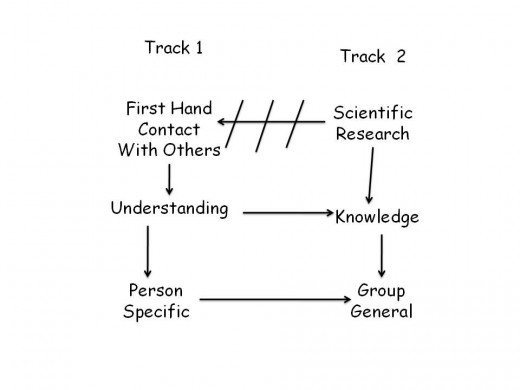
There are two tracks (Figure 2) where we get our information from. Track one is firsthand knowledge, which comes from direct interaction with people different from our self. The information gained can be applied only to the individual, not to the over all demographic. Jung is suggesting that the information from track two is a hindrance to knowing the person, because the general information and scientific information can never speak to all people. While track two is filled with the scientific knowledge needed to give an overriding picture of the situation, the specific information about the individual will be tainted by the science.
One of the tools that diversity brings to the table includes the ability to see the advantage in the difference and a willingness to communicate through the difference. This process of understanding each other is not just about White males trying to understand the relationships that have been thrust upon them. It applies to all people who want to understand how to work/live with people. Diversity is not the absence of White males; it is the ability to include everyone. This trick of understanding applies to people within their own physical demographic group. There is an excerpt out of my graduate thesis that describes the heart of the communications problem.
“The following quote by Patricia Williams is in reference to a long-standing disagreement that she had with her sister when they were young. The disagreement stemmed from what each of them perceived to be the color of the highway. One of them thought that the road was black while the other saw it as purple. It was not until much later in life did she realize that her sister was talking about the same thing as she was. Her dilemma was, if it took her that long to understand her sister, the possibility of understanding someone else seemed remote. But, she does offer a possible answer to the dialectic problem. It is not an answer that we will see take effect soon. According to her it will take generations.
“If it took years for me to understand my own sister, probably the best that Peter and I can do -- as friends and colleagues, but very different people -- is to listen intently to each other so that maybe our children can bridge the experiential distance. Bridging such gaps requires listening at a very deep level, to the uncensored voices of others.” (Williams Page 150)
This is the key to it all: it is the first step in the creation of an equal society. That is to be able to get beyond our social construction, and to get to a point where we can actually listen to what the other has to say and understand them. All real listening will do is help establish a dialog between two people. Once a dialog is established and the two are really communicating then there is a chance for a change. But, if either party stays in the same racial roles they feel they have been assigned then there will be little if any progress made.” (Monroe Page 139)
Since my surgery, I have wondered why it took so long for me to figure this simple thing out. One possible answer is the argument of “knowing,” usually presented during the course of emotionally charged conversations. During passionate exchanges, the message trying to be conveyed does not always make it through, because filters are fully engaged. This is true for both sides of the conversation. The speaker and the receiver, during an emotionally charged conversation, will have their communication defense blockers up and in place.
This does not mean that I am advocating that a person take their passion out of any conversation when they are entering into a conversation on their favorite subject. I would like just the opposite to be true. Nevertheless, being passionate about something is very different from being combative or shutting out a large segment of the conversation or population. I recently heard a speaker talking about school reform. He did a wonderful job explaining his point and delivered his message with a passion and conviction that I had not heard in a long time. Even though the topic was controversial and the subject matter is an emotionally charged one, he was able to show his passion without being combative. Because he spoke to all the people, he was not speaking to a group from different demographics; he was going beyond the differences to find the similarities. He used the points of connection as a starting point for the conversation.
Here are some closing thoughts for you to think about. Once a person believes that they know it all, then all possibility for learning has stopped. So long as the discourse is engaged, there is still hope for change. When the discourse has stopped then so has the opportunity for growth and positive change.
References
Jung, C.G. The Undiscovered Self. New York, New York. Signet Books. 2006 original copyright 1957
Williams, Patricia J. The Alchemy of Race and Rights. (London: Harvard University Press. 1991)
Monroe, Mark. The Metaphysics of Discrimination. Ann Arbor MI. UMI Dissertation Services. 2002
© 2013 Mark Monroe

![The Cancer-Fighting Kitchen, Second Edition: Nourishing, Big-Flavor Recipes for Cancer Treatment and Recovery [A Cookbook]](https://m.media-amazon.com/images/I/5118wTUfO5L._SL160_.jpg)





